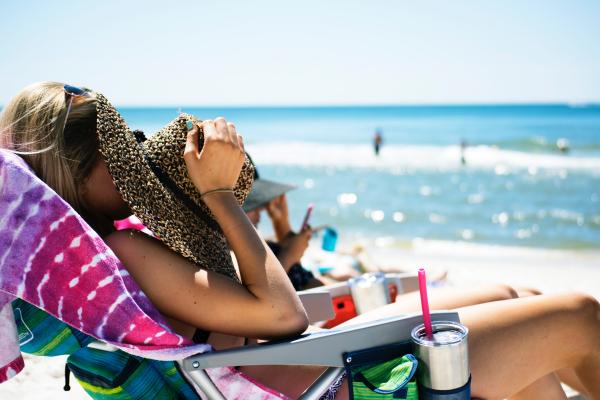
The warmer months are finally upon us and as we all emerge from the depths of lockdown, most of us can’t wait to get back outside.
But while hanging out in the sunshine and getting a tan is engrained in Australian culture, the Cancer Council are urging people to remember the importance of staying sun smart and safe this summer.
A national Cancer Council study assessing sun protection attitudes and behaviours of Australian adults showed an alarming number still prefer a bronzed body to staying sun smart – a belief that could have dire consequences.
The 2019 Summer Sun Protection Survey (Life in Australia), examined the sun protection practices of 2,154 Australian adults over the summer months.
The study found that two in five adults (40 percent) reported they like to get a suntan, and 62 percent of respondents reported having tanned skin, with sun exposure being the most common method for achieving a suntan.
Head of SunSmart and Chair of Cancer Council Australia’s National Skin Cancer Committee, Heather Walker, said it was concerning to see so many adults still seeking a suntan.
“Australians need to be reminded that there is no such thing as a safe tan,” Ms Walker said.
“When skin is exposed to UV radiation, more melanin is produced causing the skin to darken.
“This is what we know as a ‘tan’.
“A tan is a sign that skin has been damaged by UV radiation,” she said.
While these figures are a little alarming – the results weren’t all grim.
The research also showed that the majority of respondents (84 percent) protected their skin to avoid sunburn, and three in four (75 percent) respondents believed they could avoid skin cancer by regularly protecting themselves.
Ms Walker said the data provides evidence that the sun protection messaging is resonating with Australians.
“We know our SunSmart campaigns are having an impact and we’ve seen a remarkable drop in skin cancer rates over the years.
“However, there is more work to be done – particularly in combatting the myths around tanning.
“People need to understand that tanning also increases your risk of skin cancer,” she said.
Alfred Hospital Victorian Melanoma Service Director Associate Professor, Victoria Mar, reiterated the dangers involved in tanning.
“Sun damage accumulates over time, so even if you’re seeking a tan but not burning, the risks will be heightened and for some people this will result in skin cancer.
“That’s why it’s so important for Australians to use adequate sun protection and avoid tanning,” Associate Prof Mar said.
Alarmingly, Australia has the highest rate of skin cancer in the world – and this is something the Cancer Council are hoping to see change in coming years.
So whether you’re out at a barbecue or having fun at the beach this summer, remember the health advice from the SunSmart team:
– Slip on clothing that covers as much skin as possible
– Slop on SPF30 (or higher) broad-spectrum, water-resistant sunscreen
– Slap on a broad-brimmed hat that shades the face, ears and neck
– Seek Shade and
– Slide on sunglasses that meet the Australian standard for UV protection
For more information visit: www.sunsmart.com.au






